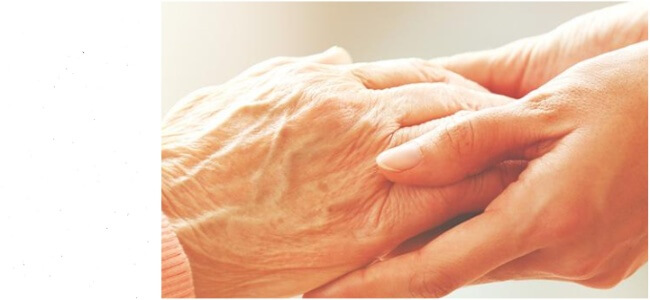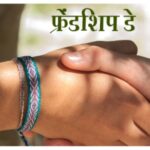Caring for elderly parents and grandparents is a rewarding experience that strengthens family bonds and creates lasting memories. Having elderly parents and grandparents at home fills the family with joy, love, and the wisdom that comes with their years of experience. Their experiences, stories, and love enrich the lives of everyone around them, creating a warm and nurturing environment. This post is about providing a South Indian diet plan for the elderly, sharing South Indian food recipes, and offering tips for elderly care at home to ensure they live healthy, comfortable, and happy lives. Caring for our elders is a privilege, and we hope these tips help you provide the best care for your loved ones.
Table of Contents
Elderly At Home | Aged Parents | Grandparents | Aged | Senior Citizens
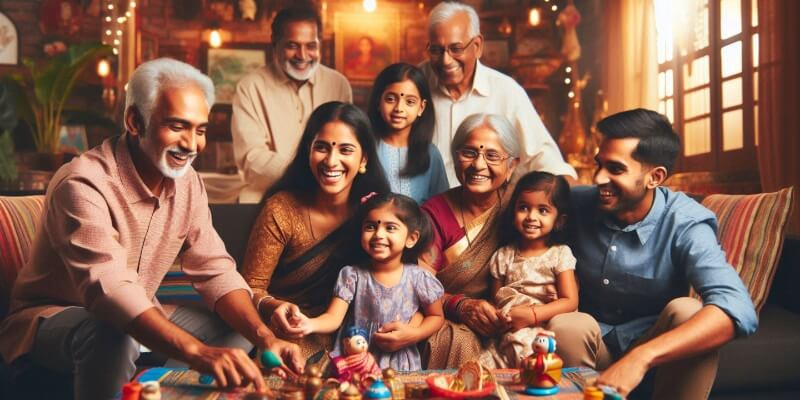
Having elderly parents and grandparents at home is truly a blessing. Their presence brings a unique warmth and wisdom that cannot be replaced. The stories they share, the memories they pass down, and the love they offer create an atmosphere of deep connection and affection in the family. There’s a special joy in seeing them interact with younger generations, teaching them valuable life lessons, and witnessing their unconditional love and care. Their experiences enrich our lives in ways words can’t fully capture, and the time spent with them is cherished by everyone in the family. The laughter, the comforting words, and the small gestures of care they give make each day feel meaningful.
However, as they grow older, their well-being becomes a significant concern. It’s important to ensure they feel safe, loved, and supported in the environment they’ve always known. Care for the elderly at home is not just about providing physical assistance but also about offering emotional and mental support.
How To Take Care Of Elderly Parents? | Care For Elderly At Home
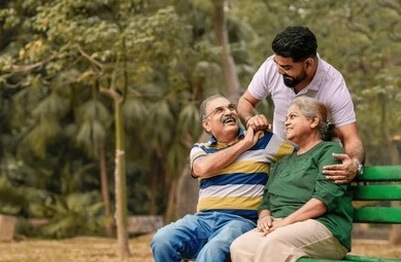
Taking care of elderly parents or grandparents requires patience, understanding, and the ability to adapt to their changing needs. From creating a comfortable living space to ensuring they follow a healthy diet and get proper medical attention, their care involves careful attention to both their physical and emotional health. Elderly care at home is about creating a balance between their independence and the support they need. By being mindful of their needs and making small adjustments in their daily routines, we can ensure they continue to thrive in the comfort of home.
If your elderly loved ones prefer South Indian food, we present to you here a South Indian diet plan for elderly that focuses on nutritious, easy-to-digest meals that cater to their health needs. From soft curries to lentil-based dishes, these meals are rich in essential nutrients, yet gentle on the stomach. You’ll also find a variety of South Indian food recipes for the elderly that are designed to provide balanced nutrition while considering their specific health conditions.
One crucial aspect of how to take care of elderly parents is maintaining a nutritious and balanced diet. By paying attention to their dietary needs, alongside proper medical care and emotional support, we can create a safe, loving environment where our elderly loved ones feel valued and cared for.
South Indian Diet Plan For Elderly
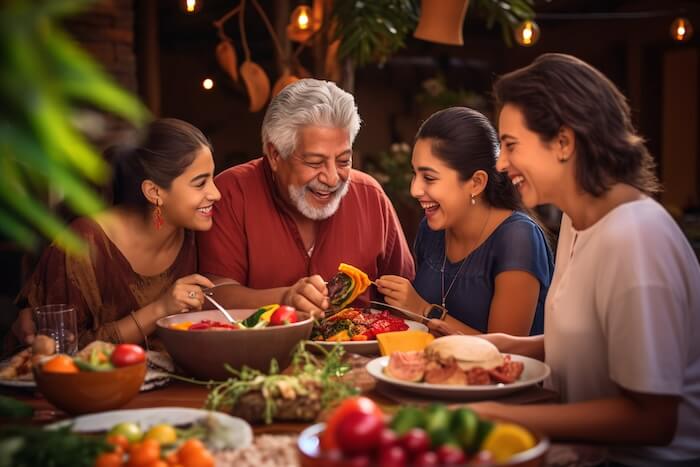
A South Indian diet plan for elderly can play a vital role in promoting overall health, with easily digestible meals that are rich in essential nutrients. Incorporating South Indian food recipes for the elderly, such as soft lentil dishes, soups, and light curries, can provide the right blend of nourishment while being gentle on the digestive system.
This diet is carefully planned considering the following:
✅ Low protein intake
✅ Low phosphorus & potassium
✅ Iron-rich foods
✅ Easily digestible & soft foods
✅ Low sodium & no processed foods
✅ Balanced carbohydrates
List of Recommended & Restricted Foods – South Indian Diet Plan For Elderly
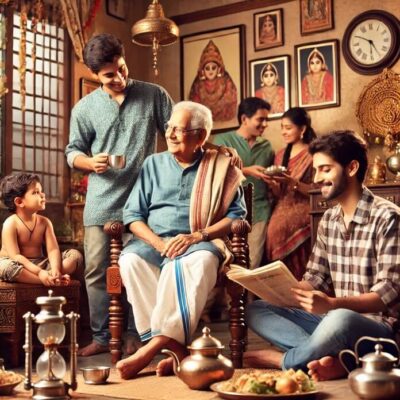
A detailed list of recommended and restricted foods for a South Indian diet plan, designed to promote health and manage specific dietary needs for the elderly.
Lentils
- Yellow Moong Dal
- Masoor Dal (Red Lentils, in small amounts, once or twice a week)
Vegetables
- Bottle Gourd
- Ridge Gourd
- Snake Gourd
- Pumpkin
- Ash Gourd
- Cabbage
- Cauliflower
- Carrot
- Beetroot
Avoid:
- Tomatoes (Use in very small quantities only)
- Potatoes, Sweet Potatoes, Drumsticks, Brinjal, Bitter Gourd, Spinach, Fenugreek, Radish
Fruits
- Apple
- Guava
- Papaya
- Pineapple
- Berries
Avoid:
Bananas, Oranges, Mangoes, Pomegranate, Jackfruit, Custard Apple, Watermelon, Coconut Water
Cereals & Grains
- Rice
- Idli
- Oats
- Ragi
- Wheat
Avoid:
Brown Rice, Bajra, Jowar, Maida
Permissible Snacks – South Indian Diet Plan for Elderly
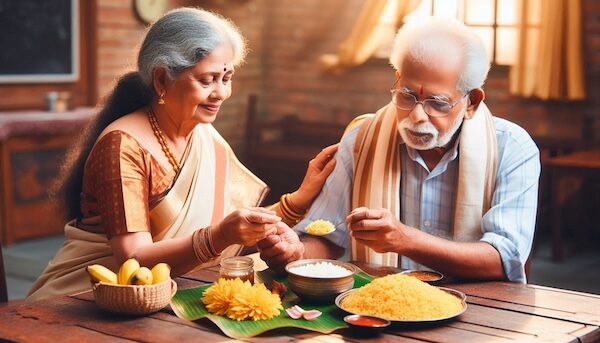
Here is a selection of permissible, nutritious snacks tailored to a South Indian diet plan for the elderly. These snacks provide elderly individuals with easy-to-digest and health-supportive options.
- Ragi Malt
- Rice Kanji
- Mashed Moong Dal Khichdi
- Thin Poha
Avoid:
Deep-fried snacks, store-bought biscuits, Namkeen, bakery items
Detailed Meal Plan – South Indian Diet Plan for Elderly
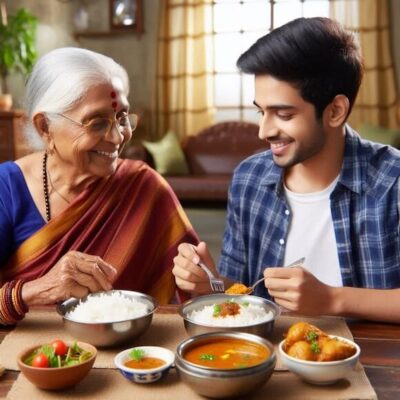
Here is a comprehensive South Indian diet plan for the elderly designed to meet their nutritional needs, focusing on easily digestible foods for improved health and well-being.
Breakfast
- Soft Moong Dal Idli with rasam
- Rice Kanji
- Oats Porridge
- Dosa with very little oil
Avoid:
Puri, Paratha, Sugary foods
Mid-Morning Snack
- Apple (mashed)
- Ragi Malt
- Pineapple ( small quantity) ( mashed)
- Guava ( small quantity) ( mashed)
- Berries ( small quantity) ( mashed)
Avoid:
High-sugar fruits, fruit juices, biscuits, fried snacks
Lunch
- White Rice
- Moong Dal
- Bottle Gourd Curry
- Steamed Vegetables (Cabbage, Ridge Gourd, Carrot)
- Thin Rasam
- Diluted Buttermilk
- Beetroot Puree
Avoid:
Thick sambhar (Toor dal), curd, tamarind-heavy dishes, pickles, heavy masala foods
Evening Snack
- Ragi Porridge (without sugar)
- Mashed Rice with thin Moong Dal
- Rice Poha (Soft, mashed with mild seasoning & buttermilk water)
Avoid:
Tea/coffee with sugar, biscuits, Namkeen, deep-fried snacks
Dinner
- Thin Rice Kanji
- Moong Dal Dosa
- Oats Vegetable Porridge (Blended with ridge gourd & carrots, no whole grains)
- Steamed Bottle Gourd with Jeera & Hing (Light seasoning)
Avoid:
Heavy dinners, spicy food, fried items, high-protein Dals
Hydration & Lifestyle Tips – South Indian Diet Plan For Elderly

Here are essential hydration and lifestyle tips tailored to a South Indian diet plan, promoting optimal health and well-being for the elderly.
- Drink small amounts of water frequently
- Avoid packaged juices, soda, and coconut water
- Encourage light exercises 2-3 times a day
- Monitor blood sugar & blood pressure regularly
- Regular health checkups ( as per doctor’s advice )
Home Health Monitoring & Caregiver Checklist – Elderly Care At Home | Elderly Care Tips
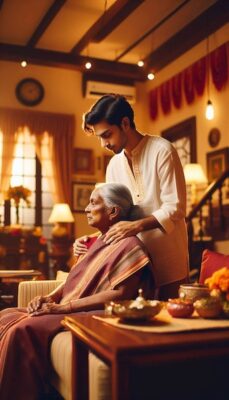
A comprehensive list for caregivers/ family members to ensure proper health monitoring and effective support for elderly individuals at home, covering key tasks, vital signs, and safety tips.
- Oral hygiene
- Monitor urine output
- Toilet & bowel health
- Bathing & hair care
- Skincare & Hygiene
- Ensure medications are taken on time and monitor for side effects
- Weight check
- Ensure correct posture
- Check hydration levels
- Monitor blood pressure
- Monitor sugar level
- Regular Health checkups
- Encourage light exercises 2-3 times a day
- Encourage social interaction (Engage in light conversation, video calls with family or simple storytelling).
- Watching TV or listening to music
- Reading or Audiobooks
- Ensure an airy and clean room (Allow fresh air, sunlight, and proper ventilation)
- Change bedsheets and bedcovers regularly
- Ensure clean clothing daily (Change and wear freshly washed clothes)
- Avoid sick family members (Flu, fever, cold, cough, or any infections should stay away from the elderly)
- Personal grooming (Regularly cut nails, trim hair, shave, and maintain hygiene)
- Encourage washing of hands before and after eating
- Assist with walking or moving around, using a walking stick or walker if walking is unsteady
- Ensure the environment is safe and clear of obstacles to prevent falls
- Observe for signs of depression or anxiety and seek professional help if necessary
- Keep up with eye exams, ensuring regular eye checkups to prevent vision issues
- Keep track of prescribed medications and dosages
- Install grab bars in the bathroom and ensure good lighting throughout the home
- Remove any tripping hazards, such as loose rugs or clutter
- Use non-slip mats and safe footwear to prevent falls
- Consult the Doctor to determine if any supplements or health drinks are necessary
- Ensure a comfortable sleep environment, including a supportive mattress and pillows
- Maintain a consistent sleep schedule to support proper rest
- Keep emergency contact numbers and medical information easily accessible
- Be prepared for medical emergencies and know the closest hospital or clinic
The above checklist will help ensure that the elderly individual’s health, safety, and well-being are consistently monitored, providing comprehensive care at home.
Emergency Signs (Immediate Attention – Doctor Visit Needed)

- Severe breathing difficulty
- Extreme swelling in legs or face
- High fever, chills, or confusion
- Chest pain or irregular heartbeat
- No urine output for 12+ hours
- Persistent cold, cough
- Unusual stool changes (Severe constipation, diarrhoea, blood in stool, or black/tarry stools)
- Skin rashes, redness, or severe itching (Possible allergic reaction, infection, or uremic toxins buildup)
- Sudden loss of appetite, nausea, or vomiting
- Dizziness, extreme weakness, or fainting (Could be due to low blood pressure, anaemia, or electrolyte imbalance)
- Any other unusual or worsening symptoms (Minor or major concerns that seem out of the ordinary should be evaluated)
Customized South Indian Food Recipes For The Elderly
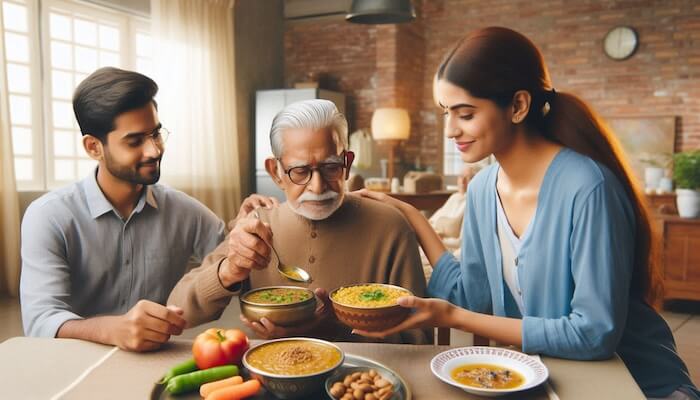
Here are a few customized South Indian food recipes for the elderly.
1. Soft Moong Dal Idli – South Indian Food Recipes For The Elderly
Ingredients:
- 1 cup idli rice
- ½ cup yellow moong dal (soaked for 6 hours)
- ½ tsp salt (very minimal)
- 1 tbsp curd (optional, for fermentation)
- Water as needed
Instructions:
- Soak idli rice & moong dal separately for 6 hours, then blend into a smooth batter.
- Allow to ferment overnight.
- Steam in idli plates for 10 minutes.
- Serve warm with diluted coconut chutney or rasam.
2. Rice & Bottle Gourd Kanji – South Indian Food Recipes For The Elderly
Ingredients:
- 2 tbsp white rice (parboiled)
- ½ cup bottle gourd (grated)
- ½ tsp cumin seeds
- 1.5 cups water
- Pinch of salt
Instructions:
- Cook rice & grated bottle gourd together until very soft.
- Blend into a smooth consistency if needed.
- Add cumin & a pinch of salt for taste.
- Serve warm with diluted buttermilk.
3. Rasam – South Indian Food Recipes For The Elderly
Ingredients:
- 1 small tomato (finely chopped)
- 1 tsp cumin seeds
- 1/4 tsp turmeric powder
- 1/4 tsp asafoetida (hing)
- 1 tsp ginger (grated)
- 1 tsp garlic (crushed)
- 1 tsp tamarind pulp (optional, adjust based on salt levels)
- Fresh coriander leaves (for garnish)
- Salt to taste (preferably rock salt, in moderation)
- 2 cups water
Preparation:
- In a small pan, dry roast cumin seeds and asafoetida until fragrant.
- Add the ginger, garlic, and tomatoes, and cook until tomatoes soften.
- Add turmeric powder and stir well. Add the tamarind pulp and water.
- Let it boil for 5-10 minutes, adjust the salt as needed.
- Garnish with coriander leaves before serving. This rasam can be served with steamed rice or as a soup.
4. Bottle Gourd Curry – South Indian Food Recipes For The Elderly
Ingredients:
- 1 medium bottle gourd (chopped into small cubes)
- 1 tsp cumin seeds
- 1/2 tsp turmeric powder
- 1 tsp mustard seeds
- 1/2 tsp ginger (grated)
- 1/2 tsp garlic (crushed)
- Fresh coriander leaves
- Salt to taste
Preparation:
- Heat oil in a pan and add cumin seeds and mustard seeds. Once they splutter, add ginger and garlic.
- Add a chopped bottle gourd, turmeric, and salt. Stir well and cook for 5 minutes.
- Add a little water, cover, and let it simmer until the bottle gourd becomes tender (about 10-15 minutes).
- Garnish with coriander leaves and serve.
5. Cabbage Curry – South Indian Food Recipes For The Elderly
Ingredients:
- 1 small cabbage (shredded)
- 1 tsp mustard seeds
- 1 tsp cumin seeds
- 1/2 tsp turmeric powder
- 1/2 tsp coriander powder
- 1/2 tsp ginger (grated)
- 1/2 tsp garlic (crushed)
- Salt to taste
Preparation:
- Heat oil in a pan, add mustard seeds and cumin seeds. Once they splutter, add ginger and garlic.
- Add shredded cabbage, turmeric powder, coriander powder, and salt.
- Stir well and cover, cook for 8-10 minutes until cabbage softens.
- Serve hot.
6. Cauliflower Curry – South Indian Food Recipes For The Elderly
Ingredients:
- 1 small cauliflower (florets)
- 1 tsp cumin seeds
- 1/2 tsp turmeric powder
- 1/2 tsp ginger (grated)
- 1/2 tsp garlic (crushed)
- 1 tsp garam masala
- Fresh coriander leaves
- Salt to taste
Preparation:
- Heat oil in a pan, add cumin seeds, ginger, and garlic.
- Add cauliflower florets, turmeric powder, garam masala, and salt.
- Stir, cover, and cook for 10-12 minutes, adding a little water if needed to soften the cauliflower.
- Garnish with coriander leaves and serve.
7. Carrot Curry – South Indian Food Recipes For The Elderly
Ingredients:
- 2 medium carrots (peeled and chopped)
- 1 tsp cumin seeds
- 1/2 tsp turmeric powder
- 1/2 tsp coriander powder
- 1/2 tsp ginger (grated)
- 1/2 tsp garlic (crushed)
- Salt to taste
Preparation:
- Heat oil in a pan, add cumin seeds, ginger, and garlic.
- Add chopped carrots, turmeric, coriander powder, and salt. Stir well.
- Add water and cook on low heat until the carrots are tender.
- Serve warm.
8. Ridge Gourd Curry – South Indian Food Recipes For The Elderly
Ingredients:
- 1 ridge gourd (chopped)
- 1 tsp mustard seeds
- 1/2 tsp turmeric powder
- 1/2 tsp cumin seeds
- 1/2 tsp ginger (grated)
- Salt to taste
Preparation:
- Heat oil in a pan, add mustard seeds, cumin seeds, and grated ginger.
- Add chopped ridge gourd, turmeric, and salt. Stir and cook for 5-7 minutes.
- Add water and let it simmer for another 10 minutes until the gourd becomes soft.
- Serve warm.
9. Beetroot Puree – South Indian Food Recipes For The Elderly
Ingredients:
- 1 medium beetroot (peeled and chopped)
- 1/4 tsp cumin powder
- 1/4 tsp turmeric powder
- Salt to taste
Preparation:
- Steam or boil the beetroot until soft.
- Blend it into a smooth puree, adding a little water as needed.
- Add cumin powder, turmeric, and salt to taste.
- Serve warm.
10. Ragi Porridge – South Indian Food Recipes For The Elderly
Ingredients:
- 1 tbsp ragi flour
- 1 cup water or milk (preferably low-fat milk)
- 1/4 tsp cardamom powder
- Sweetener (stevia or jaggery, optional)
Preparation:
- Mix the ragi flour with water or milk to make a smooth paste.
- Bring it to a boil while stirring constantly to prevent lumps.
- Add cardamom powder and sweetener (if desired).
- Simmer for 5 minutes, and serve warm.
11. Moong Dal Dosa – South Indian Food Recipes For The Elderly
Ingredients:
- 1/2 cup moong dal (soaked for 4-6 hours)
- 1/4 tsp cumin seeds
- 1/4 tsp black pepper powder
- Salt to taste
- Water (for batter)
Preparation:
- Grind the soaked moong dal into a smooth batter, adding water as needed.
- Add cumin seeds, black pepper, and salt to the batter.
- Heat a non-stick pan, pour a ladle of batter, and spread it into a thin dosa.
- Cook on both sides until golden and serve with chutney or sambar.
12. Oats Vegetable Porridge – South Indian Food Recipes For The Elderly
Ingredients:
- 1/4 cup oats
- 1/2 cup mixed vegetables (carrots, peas, beans, finely chopped)
- 1/2 tsp cumin seeds
- 1/2 tsp turmeric powder
- Salt to taste
- 2 cups water
Preparation:
- Heat oil in a pan, add cumin seeds, and sauté vegetables.
- Add oats, turmeric, and salt, stirring well.
- Add water, bring to a boil, and cook for 5-7 minutes, stirring occasionally until oats are soft.
- Serve warm.
13. Sabudana Khichdi – South Indian Food Recipes For The Elderly
Ingredients:
- 2 tbsp Sabudana (tapioca pearls)
- 1 cup water (or unsweetened almond milk for a creamy option)
- 1 tbsp roasted peanuts (for added protein and iron)
- 1/4 tsp cumin powder
- 1/4 tsp cardamom powder (optional, for flavor)
- A pinch of salt (preferably rock salt, in moderation)
- 1/2 tsp ghee (optional, for flavour and healthy fat)
- 1-2 tsp fresh lemon juice (for vitamin C to help with iron absorption)
- A small handful of finely chopped coriander leaves (optional, for garnish)
Preparation:
-
Soak the Sabudana: Wash the Sabudana thoroughly and soak it in water for about 4-6 hours, or overnight. Drain the water before cooking.
-
Cook the Sabudana: In a non-stick pan, heat the 1 cup of water (or almond milk) on medium heat. Add the soaked abudana and cook while stirring gently. Keep stirring to ensure it doesn’t stick to the bottom and cooks evenly. This will take about 8-10 minutes.
-
Flavouring: Once the Sabudana turns soft and translucent, add the cumin powder, cardamom powder (if using), and salt. Stir well to incorporate the spices.
-
Add Protein & Iron: Add the roasted peanuts for a boost of protein and iron. Roasting peanuts can also reduce the glycemic index, making it more suitable for a prediabetic diet.
-
Optional Ghee: Stir in the ghee for added flavour and healthy fats, which are important for overall well-being, especially for an elderly person.
-
Finish with Lemon: Once the porridge is ready, add a squeeze of fresh lemon juice to enhance the flavour and aid in the absorption of iron from the peanuts.
-
Serve: Garnish with fresh coriander leaves if desired and serve warm.
Here are two smooth, easy-to-swallow soups that are healthy and suitable for an elderly individual. These soups are packed with nutrients and gentle on the digestive system. These soups are nutrient-dense and gentle on the digestive system. These soups can be served as part of a well-balanced diet for the elderly.
14. Carrot Soup – South Indian Food Recipes For The Elderly
This carrot soup is rich in vitamins, especially vitamin A, and is easy to swallow.
Ingredients:
- 2 medium carrots (peeled and chopped)
- 1 small potato (optional, for creaminess)
- 1/2 tsp cumin seeds
- 1/4 tsp turmeric powder
- 1/2 tsp ginger (grated)
- 1/4 tsp black pepper powder (optional)
- A pinch of salt (preferably rock salt, in moderation)
- 2 cups water or low-sodium vegetable broth
- 1 tsp ghee (optional, for flavor)
- Fresh coriander leaves (optional, for garnish)
Preparation:
-
Cook the Vegetables: In a saucepan, add chopped carrots and potato (if using) along with 2 cups of water or vegetable broth. Cook on medium heat until the vegetables are tender (about 10-12 minutes).
-
Prepare the Tempering: In a separate pan, heat ghee and add cumin seeds and grated ginger. Sauté for a minute until fragrant.
-
Blend the Soup: Once the vegetables are soft, use a hand blender or a regular blender to blend the soup until smooth and creamy. If needed, add more water or broth to reach the desired consistency.
-
Season: Add turmeric powder, black pepper, and rock salt to taste. Stir well and let it simmer for another 5 minutes.
-
Serve: Garnish with a few coriander leaves (if desired) and serve the soup warm.
15. Vegetable Soup (Blended) – South Indian Food Recipes For The Elderly
A vegetable soup filled with a variety of soft, easily digestible vegetables that can be blended for those with swallowing difficulties.
Ingredients:
- 1/4 cup moong dal (yellow split lentils, a good source of protein and iron)
- 1 small carrot (peeled and chopped)
- 1 small zucchini (peeled and chopped)
- 1/2 small pumpkin (peeled and chopped)
- 1/4 tsp cumin seeds
- 1/4 tsp turmeric powder
- 1/2 tsp ginger (grated)
- A pinch of salt (rock salt, in moderation)
- 1 tsp ghee (optional)
- 2 cups water or low-sodium vegetable broth
Preparation:
-
Cook the Moong Dal: Wash the moong dal and cook it with 1 cup of water until soft and mushy (about 10 minutes in a pressure cooker or 15-20 minutes in a regular pot).
-
Cook the Vegetables: In a separate pan, add chopped carrot, zucchini, and pumpkin along with 1 cup of water or vegetable broth. Cook on medium heat until the vegetables are soft (about 10-12 minutes).
-
Prepare the Tempering: In a small pan, heat ghee and add cumin seeds. Once they splutter, add grated ginger and sauté for a minute.
-
Blend the Soup: Once the vegetables are tender, combine them with the cooked moong dal. Use a hand blender or regular blender to blend the mixture until smooth and creamy. Add water as needed to reach the desired consistency.
-
Season: Add turmeric powder and salt (rock salt, in moderation) to taste. Stir well and simmer for another 5 minutes.
-
Serve: Serve warm, and you can garnish with a small amount of fresh coriander leaves if desired.
16. Carrot & Moong Dal Halwa (Sweet Porridge) – South Indian Food Recipes For The Elderly
This Carrot & Moong Dal Halwa is a healthy and comforting dessert. The carrots provide beta-carotene, and moong dal is an excellent source of protein and iron.
Ingredients:
- 2 medium carrots (peeled and grated)
- 1/4 cup moong dal (yellow split lentils)
- 1/2 tsp cardamom powder
- 1/4 tsp turmeric powder (optional)
- A pinch of salt (rock salt, in moderation)
- 1-2 tbsp ghee (optional, for healthy fats)
- 1 tbsp chopped nuts (like almonds or cashews, optional, finely ground if needed)
- 1-2 tsp stevia or monk fruit sweetener (optional, depending on sweetness preference)
- 1 cup water or unsweetened almond milk
Preparation:
-
Cook the Moong Dal: Wash the moong dal thoroughly and cook it with 1 cup of water until soft and mushy (you can use a pressure cooker for faster cooking, about 3-4 whistles).
-
Prepare the Carrots: In a separate pan, add the grated carrots and 1/2 cup of water or almond milk. Cook them on low-medium heat until the carrots soften (about 10-12 minutes).
-
Combine the Dal and Carrots: Once the carrots are soft, add the cooked moong dal to the pan with the carrots. Stir well and cook for another 5 minutes to allow the flavours to combine.
-
Flavour and Sweeten: Add cardamom powder, turmeric (optional), a pinch of rock salt, and stevia or monk fruit sweetener to taste. Stir everything together.
-
Add Ghee & Nuts: Optionally, add ghee for flavour and extra healthy fat. If using, add finely ground nuts (for extra protein and iron) and cook for another 2-3 minutes.
-
Serve: The halwa should have a soft, porridge-like texture, making it easy to swallow. Serve warm.
These recipes are designed to be gentle on the digestive system while also providing essential nutrients for the elderly.
Our parents and grandparents are truly blessings to the family, bringing love, wisdom, and a deep sense of belonging. The bond shared with the elderly at home nurtures a strong connection and gratitude, with their presence strengthening family ties. Ensuring the well-being of the elderly, both physically and mentally, is of the utmost importance, as it allows them to lead fulfilling lives while staying surrounded by the love and care of their family.
This post about the South Indian diet plan for the elderly, South Indian food recipes, and tips for elderly care at home provides a valuable guide to improving the health and well-being of elderly individuals. By focusing on nutrient-dense, easily digestible foods and offering practical caregiving tips, we aim to support caregivers in providing better care at home.
It is essential to adapt diet and care practices based on individual health conditions, and always consult healthcare professionals for personalized advice. The right diet and proper care can significantly enhance the quality of life for elderly individuals, promoting better health outcomes. We hope this post has been helpful, and encourage you to share it with others who might benefit from these insights.
Disclaimer
The South Indian diet plan for elderly, South Indian food recipes for the elderly, and tips for elderly care at home provided in this post are intended as general guidance and recommendations based on common health concerns of the elderly population. Each individual’s health condition is unique, and we emphasize the importance of personalized care tailored to specific medical needs.
The dietary and care tips outlined here should not be considered a substitute for professional medical advice, diagnosis, or treatment. It is advisable to always consult with a doctor, healthcare professional, or dietitian before making any changes to diet, care routines, or food preparation, especially for those with underlying health conditions.
This post is a generic resource for elderly care, aimed at promoting overall health and well-being. However, the recommendations and suggestions provided may or may not be suitable for every elderly individual, depending on their specific health status. Therefore, it is essential to proceed with caution and ensure that any changes to diet or care are made with the guidance of a physician, specialist, or qualified healthcare provider.
Please take the necessary precautions and follow the doctor’s advice for elderly individuals at home, adjusting any recommendations as needed to meet the individual’s health requirements.
We would love to hear your thoughts on this post about the South Indian diet plan for the elderly, South Indian food recipes for the elderly, and tips for elderly care at home. Are you currently a caregiver, or do you have elderly parents at home? Feel free to share your own experiences and any tips you have found helpful for caring for the elderly. If you found this post about the South Indian diet plan for the elderly, South Indian food recipes for the elderly, and tips for elderly care at home useful, please share it with your friends, and family, and on social media platforms to spread the word!
#ElderlyCare #Caregiver #DietPlan #Recipes #ElderCare #SeniorCare #AgedCare
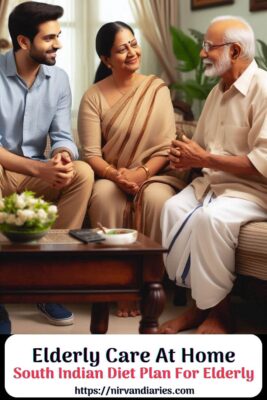
Thanks for visiting our site nirvandiaries.com and taking the time to read this post.
If you wish to collaborate or work with us then reach us at [email protected]
We’d love it if you’d comment by sharing your thoughts on this post and share this post on social media and with your friends.
Follow our journey on our social media channels:
X Instagram Pinterest
